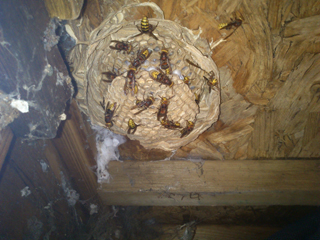 At the end of July/beginning of August I started to remove the supers from those hives in which a surplus of honey had been stored. Then we went away and I am writing this whilst still away, so it will be interesting to see what I find on our return this week. We have had glorious weather during the first 8 days here in Tunbridge Wells and have been out every day visiting family and going to various National Trust properties and the gardens at RHS Wisley, admiring the diversity of plants that are able to be grown here, in what are basically inland gardens.
At the end of July/beginning of August I started to remove the supers from those hives in which a surplus of honey had been stored. Then we went away and I am writing this whilst still away, so it will be interesting to see what I find on our return this week. We have had glorious weather during the first 8 days here in Tunbridge Wells and have been out every day visiting family and going to various National Trust properties and the gardens at RHS Wisley, admiring the diversity of plants that are able to be grown here, in what are basically inland gardens.
Many of their flowers, though, wouldn’t last five minutes on our coast in Cornwall, which is a shame because there were lots of bees foraging for nectar and pollen wherever we went. I understand that the Roseland hasn’t been so fortunate, and the weather has been somewhat on the wet side, so regarding the bees I can only hope that they have had the opportunity to get out and about in between the rain.
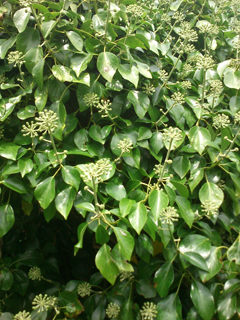 Whilst I have removed most of the honey crop from most of the hives, there were still some hives which had yet to fill their final super, so I left the partially filled combs in place. I suspect that by the time we get home, the bees will have used up those extra stores to feed their brood and themselves whilst being unable to get out and about in the wet, which, if the bees have survived, is fine by me. It just means my honey crop will be lower this year as a result.
Whilst I have removed most of the honey crop from most of the hives, there were still some hives which had yet to fill their final super, so I left the partially filled combs in place. I suspect that by the time we get home, the bees will have used up those extra stores to feed their brood and themselves whilst being unable to get out and about in the wet, which, if the bees have survived, is fine by me. It just means my honey crop will be lower this year as a result.
Mind you, we were really spoilt last year with a Spring crop, a Summer crop and an Autumn crop. To expect the same again this year is really expecting too much, so I must be content with what I have removed so far. Once home, I will start to extract what I already have and when placing the extracted supers back on the hives for cleaning, will remove any surplus remaining. That way the bees will have a top-up of stores from their cleaning of the returned super and a storage area for the anticipated ivy flow whenever that starts, which looked imminent when we left
In two weeks time we are part-hosting our annual “thrash”, called “A Bit of a Do” at Truro School. This is a shared event between West Cornwall Beekeeping Association and Cornwall Beekeeping Association at which three top-ranked beekeeping experts have been invited to present to us on current beekeeping topics.
Dan Basterfield, who holds the National Diploma in Beekeeping, Pam Hunter, who is a Master Beekeeper, and Professor Juliet Osborne, from the University of Exeter, Penryn Campus are the speakers who will offer sessions on “The Evolution of Plants and Insects”, “Bee Sex”, “Adult Bee Dissection”, “Swarms, Swarms, Swarms – the Why and How” and “The Birds and the Bees – a Perfect Match?”.
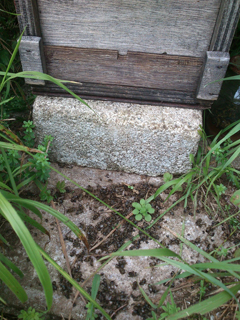 The day promises to give a fascinating insight into the minutiae of honeybees, their ecology and physiology and is part of the Associations’ intent and constitutional objective to raise the awareness of and offer education opportunities to new and established beekeepers. Such an on-going education programme is the only way we can hope to reverse the current decline in the numbers of honeybees in the UK.
The day promises to give a fascinating insight into the minutiae of honeybees, their ecology and physiology and is part of the Associations’ intent and constitutional objective to raise the awareness of and offer education opportunities to new and established beekeepers. Such an on-going education programme is the only way we can hope to reverse the current decline in the numbers of honeybees in the UK.
Whatever kind of summer we have or have had (if it’s over for another year!), such education is crucial to our understanding of at least some of the problems facing honeybees currently and will hopefully help us to help the bees, who are suffering from habitat loss, climate change, insecticide poisoning and the predations of the Varroa mite. This does not deter those of us established in beekeeping but rather incents us to improve our management techniques in ways that will help the bees, but it’s tough for new beekeepers that are starting from a position of zero knowledge yet wanting to help the bees survive.
This is also where my courses come into their own, because these are aimed at those with no prior knowledge, yet by the end of 20 hours study provide students with sufficient knowledge to start keeping bees straight away. If you are interested, contact Truro College on 01872 265800 to enrol or contact me for further information.
I mentioned some of the challenges facing the honeybees, but there is another, annual, challenge that bees must overcome. That is the autumn onslaught of the wasps. Wasps (and hornets), unlike honeybees, have an annual life-cycle – the queen starts to build a nest in the late Spring in which she lays eggs. The larvae that hatch from eggs she has laid in the partly formed nest, after emerging as fully grown adults, then take over the further building of the nest and the feeding of the young.
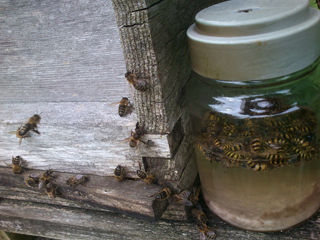 Wasps and hornets, unlike honeybees, are omnivores, with the young larvae needing meat for their development. The adults therefore predate on smaller insects, bringing these back to the nest to feed the larvae. The larvae, in return, then exude a sweet liquid off which the adults feed, and so the cycle continues. In the late summer, though, the number of eggs that the queen lays reduces, as then does the number of larvae, whilst the adult population is at its maximum.
Wasps and hornets, unlike honeybees, are omnivores, with the young larvae needing meat for their development. The adults therefore predate on smaller insects, bringing these back to the nest to feed the larvae. The larvae, in return, then exude a sweet liquid off which the adults feed, and so the cycle continues. In the late summer, though, the number of eggs that the queen lays reduces, as then does the number of larvae, whilst the adult population is at its maximum.
This means that the amount of “sweetness” available to adults from feeding their young is vastly diminished, so the adults look elsewhere to satisfy their need. And where do they look? At outdoor feeding posts of adult humans (patios, gardens, cafes, etc) – have you ever tried having an outdoor cream tea in August? Impossible! Also, beehives become very attractive places – for two reasons. The first is the meat part of their diet – adult bees or larvae from inside the hive.
The second is the honey, fulfilling their need for sweetness. This means that every year beekeepers need to watch their hives carefully for signs of robbing by wasps and hornets (as well as from other bees, by the way!). The weakest hives are easily found, so the secret is strong colonies – unless you happen to have a nucleus coming along building up for the winter. I have already lost one nucleus colony to wasp predation, despite taking all precautions.
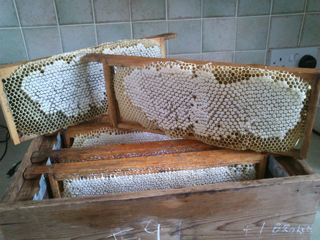 The problem is, the wasps are active in the very early morning and late into the evening, when the bees are inside and not flying, so they can infiltrate into the hive, take on the hive scent after a few visits, and take whatever they want. Beekeepers, myself included, generally place wasp traps around the apiary to catch these miscreants, and though I have lost a nucleus, all my other colonies so far appear to be holding their own – and, in fact, I haven’t seen very many wasps around at all this year, except in my traps. But they are still around, so I will be checking on my return and reducing hive entrances and topping up the traps.
The problem is, the wasps are active in the very early morning and late into the evening, when the bees are inside and not flying, so they can infiltrate into the hive, take on the hive scent after a few visits, and take whatever they want. Beekeepers, myself included, generally place wasp traps around the apiary to catch these miscreants, and though I have lost a nucleus, all my other colonies so far appear to be holding their own – and, in fact, I haven’t seen very many wasps around at all this year, except in my traps. But they are still around, so I will be checking on my return and reducing hive entrances and topping up the traps.
So the days are gone when you could just leave your bees alone until the end of August. You need to defend against wasps, remove the honey crop, and treat for Varroa before the winter bees are born, thereby giving the colonies a better chance of surviving what winter might throw at them.
There’s never a day off in the beekeeper’s life!
Colin Rees – 01872 501313 – colinbeeman@aol.com
